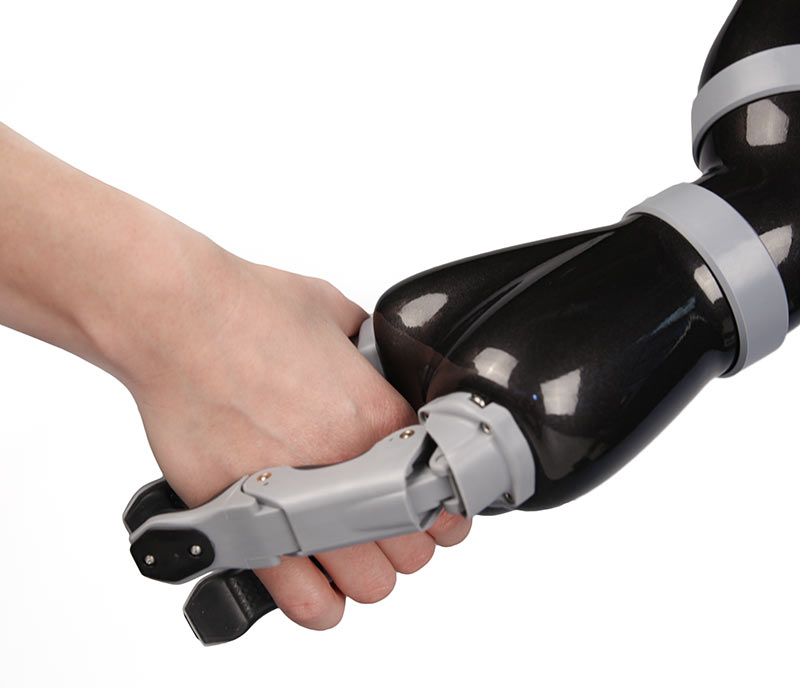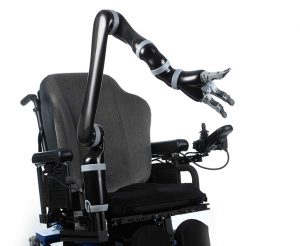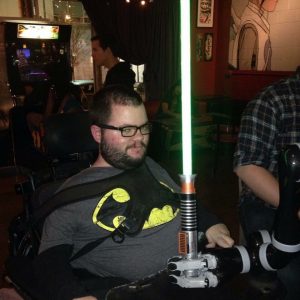Kinova Robotics Wants Jaco to Keep Changing Lives for the Better
Written by |

Jaco robotic arm by Kinova Robotics. (Photo courtesy of Kinova Robotics)
As a youth, Charles Deguire did everything he could to help three uncles with muscular dystrophy.
One of them, Jacques Forest, had designed a clever makeshift arm that could pick up objects. He built it with whatever was available — including windshield wiper motors, parts of a desk lamp, and hotdog tongs. And the first thing Forest did with his arm was pick a rose for his sister.
After his uncle died, Deguire began making the invention better.
Sixteen years later, Kinova Robotics was born. Founded by Deguire and another engineer, Louis-Joseph Caron L’Ecuyer, the Canada-based company operates globally, designing and building robotics platforms and components.
Although much of what it produces has industrial, research or other applications, Kinova also makes devices that empower those with physical disabilities. In that respect, its star is Jaco, named for its original designer.
Launched in 2009 and sold in the U.S. for the past three years, Jaco is a six-axis robotic manipulator arm with a two- or three-finger hand. It significantly improves the lives of those with reduced upper body mobility by helping them perform complex actions.
Kevin Schaefer can attest to its usefulness. He has a form of spinal muscular atrophy (SMA), a genetic disease that causes muscle weakness and progressive loss of movement. Attached to his wheelchair and controlled by a joy stick, Jaco allows Schaefer to feed himself, press elevator buttons, scratch his head, and adjust his glasses — all things he either could no longer do or was never able to do.
“My independence has skyrocketed,” said Schaefer, 23, a columnist for SMA News Today. “Before, I’d have to contact friends to have someone to be with me to help me. Now I can be left alone if I need to.”
Schaefer, who lives with his parents in Cary, North Carolina, was diagnosed with SMA type 2 at 18 months, and began losing arm and upper body strength when he was a high school sophomore. He tried an assistive device, but it required physical strength and didn’t work well.
When Schaefer was in college, his mother discovered Jaco. Back then, hardly any insurance covered the $50,000 device. So, he and his family did a fundraising campaign. He got his robotic arm in 2015.
“It’s incredibly easy to use,” Schaefer said. “I can change modes and use the entire arm, or just the fingers. I adapted to it fairly quickly, and my parents love it.”
Kinova has sold about 300 globally for rehabilitative purposes, mostly in the Netherlands and other European countries. In the U.S., the company has been increasingly successful getting private insurance to cover Jaco, said Abe Clark, a Kinova product specialist. It is still trying to obtain Medicare and Medicaid coverage.
The arm has also become a research tool in labs worldwide. It has been used in tandem with a four-wheel robot, and mounted with a spraying device, to kill the Ebola virus. “Because of its characteristics, it’s useful for science,” Clark said in an interview. “It’s lightweight and compact and easy to set up.”
While the mechanics of each arm are identical, they can be set up to suit each user’s taste and environment. “There are tens of thousands of ways to program the robot,” Clark said.
Initially, a Kinova representative visits a user to do an evaluation and get a rough idea of the programming that needs to be done. Later, the arm is fine-tuned, and capabilities are added. Typically, Clark said, the device’s owner uses only 15 to 20 percent of what the robot is capable of.
Jaco can do things like pick up something from the floor, open doors that don’t have knobs, hold levers down, scratch an itch, adjust a baseball cap or eyeglasses, flip a light switch, adjust a thermostat, and brush teeth. The robot reduces caregiver dependency by at least 41 percent, Clark said, adding that it’s used by a variety of patients, including those with spinal cord injuries, SMA, muscular dystrophy, ALS, and stroke.
“A person with severe spastic cerebral palsy, for instance, puts out an incredible amount of effort to do the simplest task,” Clark said.
Early on, Jaco was marketed door-to-door to rehabilitation centers and at trade shows. As word-of-mouth spread, the device became increasingly popular. It’s now in big demand, Clark said. Jaco users can be as young as 5, depending on their cognitive ability.
“It’s the only product that offers immediate, profound change to the life of wheelchair users and caregivers,” he said, adding that Jaco works with nearly every type of chair and nearly any level of user ability.
In its second generation, Jaco is going through a round of enhancements. “More and more things are being discovered that will improve performance, user-friendliness and durability,” Clark said.
Kinova also produces a couple of other assistive robots. One is Mico, a two- or three-finger apparatus used mostly by research centers and for light manufacturing. Gowing is a powered arm support designed for people who have a power chair and the ability to grasp, but who cannot lift their arms. Essentially, the $25,000 product makes their arm weightless.
“There have been no devices to help people with upper limb disabilities,” said Ron Borgshulte, owner of Partners in Medicine, Jaco’s U.S. distributor.
“We have a chair if you can’t walk,” he said. “If you can’t use your upper limbs, there’s nothing available for you. If a person loses an arm, we give them a prosthetic. If a person is a quadriplegic and can’t use either arm, we do nothing. We give them round-the-clock caregivers. With these devices, users are getting independence, self-worth and self-confidence.”
One of Canada’s fastest-growing companies, Kinova recently received $25 million from a handful of investors. Based in Quebec, it recently opened an office in Germany and started a medical robotics division. It is also set to roll out Movo, a mobile manipulation platform designed to aid in mobile robot research and experimentation.
Borgshulte said the response he gets from users and caregivers once Jaco is set up can be overwhelming.
“Once they have it and get it going, there’s hardly a dry eye in the house,” he said.





